Bulgaria fell deeper in the energy trap
Adelina Marini, April 27, 2009
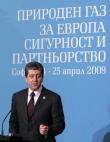 The Sofia summit - "Natural gas for Europe - security and partnership" cost a lot of efforts for the Bulgarian president Georghi Parvanov to realise this initiative and make it a significant event. It was hard because against the background of this broadly advertised initiative, the prime minister Sergey Stanishev organised a parallel meeting but with accent on business and the Sofia meeting was organised between other major events on the same issue in much more strategic regions like Turkmenistan, Washington and the summit in Prague will be in May.
The Sofia summit - "Natural gas for Europe - security and partnership" cost a lot of efforts for the Bulgarian president Georghi Parvanov to realise this initiative and make it a significant event. It was hard because against the background of this broadly advertised initiative, the prime minister Sergey Stanishev organised a parallel meeting but with accent on business and the Sofia meeting was organised between other major events on the same issue in much more strategic regions like Turkmenistan, Washington and the summit in Prague will be in May.
But what was the final result from Parvanov's forum. In the first place, the president was happy because the meeting wasn't a total failure. One of the key participants was the president of the European Commission which is a level, definitely. Only within 20 days the sheikh of Qatar came for a second time. Other participants were the presidents of the countries from the region like the Serbian Boris Tadic, the president of Montenegro and Turkey. One of the most anticipated, or the opposite - the most unwelcome - guest - the prime Minster of Russia Vladimir Putin. He didn't come, as the deputy prime minister and foreign minister Ivaylo Kalfin announced days before the forum, because Putin wanted the signing of a deal for "South Stream" in the framework of the forum. The "South Stream" project is very controversial from a European point of view because, to some extent, it duplicates the much more acceptable for the EU "Nabucco" project.
Now let's see some of the positions. In his speech at the press conference at the end of the  summit* president Parvanov said that the Bulgarian position is that we agree with "South Stream" but if the contract with "Gazprom" for gas delivery is changed. The position of the government is different - it doesn't want Russia to use our current gas infrastructure, i.e. the current pipelines and wants new pipes to be built. This was announced for the first time by the energy minister Petar Dimitrov during president Parvanov's visit in Moscow where he said he's ready to give Bulgaria's pipelines to Russia for "South Stream" because this would make Bulgaria much more dependant on Russia and its possible disputes with transiting countries. The president also reminded that political agreements are more important than business differences that have occurred between the Bulgarian Energy Holding (a new state mega structure) and Gazprom (state monopolist). This was exactly what the Russian energy minister Sergey Shmatko said: "There are signed political agreements between Russia and Bulgaria. In this regard there are no more questions on whether there will be any cooperation or not. There are only two issues that are still not coordinated between the Bulgarian Energy Holding and Gazprom. I am convinced that with the relative efforts, these uncoordinated positions, not contradictions, for the usage of the gas infrastructure and the transfer of part of the grid in the scheme of "South Stream", these contradictions have a specific corporate character. That is why they have to implement the political agreements and the corporate disputes are not relevant. Very soon, I don't know exactly when, the documents will be signed".
summit* president Parvanov said that the Bulgarian position is that we agree with "South Stream" but if the contract with "Gazprom" for gas delivery is changed. The position of the government is different - it doesn't want Russia to use our current gas infrastructure, i.e. the current pipelines and wants new pipes to be built. This was announced for the first time by the energy minister Petar Dimitrov during president Parvanov's visit in Moscow where he said he's ready to give Bulgaria's pipelines to Russia for "South Stream" because this would make Bulgaria much more dependant on Russia and its possible disputes with transiting countries. The president also reminded that political agreements are more important than business differences that have occurred between the Bulgarian Energy Holding (a new state mega structure) and Gazprom (state monopolist). This was exactly what the Russian energy minister Sergey Shmatko said: "There are signed political agreements between Russia and Bulgaria. In this regard there are no more questions on whether there will be any cooperation or not. There are only two issues that are still not coordinated between the Bulgarian Energy Holding and Gazprom. I am convinced that with the relative efforts, these uncoordinated positions, not contradictions, for the usage of the gas infrastructure and the transfer of part of the grid in the scheme of "South Stream", these contradictions have a specific corporate character. That is why they have to implement the political agreements and the corporate disputes are not relevant. Very soon, I don't know exactly when, the documents will be signed".
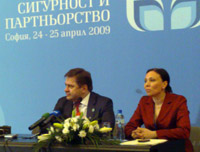 On the next day the Russian energy minister was much more specific - there is a rapprochement in the positions of Russia and the Bulgarian Energy Holding. And president Georghi Parvanov even suggested that by the end of May there might be a signed document. As of today the Bulgarian prime-minister Sergey Stanishev is in Moscow - the official version is to open a big exhibition on the occasion of the Bulgarian year in Russia.
On the next day the Russian energy minister was much more specific - there is a rapprochement in the positions of Russia and the Bulgarian Energy Holding. And president Georghi Parvanov even suggested that by the end of May there might be a signed document. As of today the Bulgarian prime-minister Sergey Stanishev is in Moscow - the official version is to open a big exhibition on the occasion of the Bulgarian year in Russia.
But what is the position of the US? Again in the framework of the Sofia summit (the president should again be very proud) was the first meeting between the newly appointed special envoy on energy issues Richard Morningstar and the Russian energy minister Sergey Shmatko. I will only mention here that this meeting was defined by the Russian minister as not a standard one. According to both politicians, the basics for further dialogue have been put forward. But ... with regard to "South Stream" the US have a lot of doubts especially with regard to the price and profit. Washington considers this project very expensive and advises a lot of caution when thinking if it makes sense for Bulgaria and therefore for the EU. The Russian energy minister pointed out that, on the contrary, this project is much more cheaper than "Nabucco" because it is Russia that defines the prices as the whole process of delivery depends on Russia. Richard 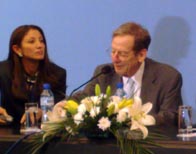 Morningstar had met consecutively with the president Parvanov, with the prime minister Stanishev, the foreign minister Kalfin and the energy minister Petar Dimitrov and he said he was left under the impression that all of them realise what the risks around this project are and what questions should be asked. What Mr. Morningstar probably doesn't know is that Bulgaria might be aware of the risks but the parts of the jigsaw puzzle might be arranged in such a way that Bulgaria doesn't have a reasonable move. Still the Americans, as usual, react pragmatically and state: we are not saying yes or no to any project. If it is profitable and there's an economic logic in it - go ahead. But if not, you better give it up. In the same time they underline that no project is the Holy Grail. Nevertheless they are more inclined to support the "Nabucco" project because: "Europe is an old and strong ally. Europe needs to be strong and prosperous. We all have financial difficulties right now and it would be of great importance for the European economy to have good and reliable energy deliveries. We need Europe to tackle other global issues. And from a humanitarian point of view - such things as in the beginning of the year, cannot happen again", said Mr. Morningstar.
Morningstar had met consecutively with the president Parvanov, with the prime minister Stanishev, the foreign minister Kalfin and the energy minister Petar Dimitrov and he said he was left under the impression that all of them realise what the risks around this project are and what questions should be asked. What Mr. Morningstar probably doesn't know is that Bulgaria might be aware of the risks but the parts of the jigsaw puzzle might be arranged in such a way that Bulgaria doesn't have a reasonable move. Still the Americans, as usual, react pragmatically and state: we are not saying yes or no to any project. If it is profitable and there's an economic logic in it - go ahead. But if not, you better give it up. In the same time they underline that no project is the Holy Grail. Nevertheless they are more inclined to support the "Nabucco" project because: "Europe is an old and strong ally. Europe needs to be strong and prosperous. We all have financial difficulties right now and it would be of great importance for the European economy to have good and reliable energy deliveries. We need Europe to tackle other global issues. And from a humanitarian point of view - such things as in the beginning of the year, cannot happen again", said Mr. Morningstar.
 And though ambassador Morningstar did not want to interfere with the political games in Europe, he reminded that Iran, yes, could participate in "Nabucco" but before that the country has to prove that: 1. It really will accept the hand offered by the new administration in Washington and 2. it is ready to negotiate on its nuclear programme. But before that the US see as potential suppliers for "Nabucco" Azerbaijan, Turkmenistan and even, a bit later - Iraq. Indeed "Nabucco" is an important project for the US but not the only one. Thus the door for further American diplomatic actions remained open. But for the EU this door is with code which combinations is very difficult to guess.
And though ambassador Morningstar did not want to interfere with the political games in Europe, he reminded that Iran, yes, could participate in "Nabucco" but before that the country has to prove that: 1. It really will accept the hand offered by the new administration in Washington and 2. it is ready to negotiate on its nuclear programme. But before that the US see as potential suppliers for "Nabucco" Azerbaijan, Turkmenistan and even, a bit later - Iraq. Indeed "Nabucco" is an important project for the US but not the only one. Thus the door for further American diplomatic actions remained open. But for the EU this door is with code which combinations is very difficult to guess.
*Although a press conference of the president Georghi Parvanov had been announced, he made a prolonged statement and noted that most of the news from the energy summit had been duly reported by all media but nevertheless he and his team were ready to answer any questions. I took that as an attempt not to answer any queries from the journalists because they had not understand anything from the first day of the summit. In fact, from the second either.
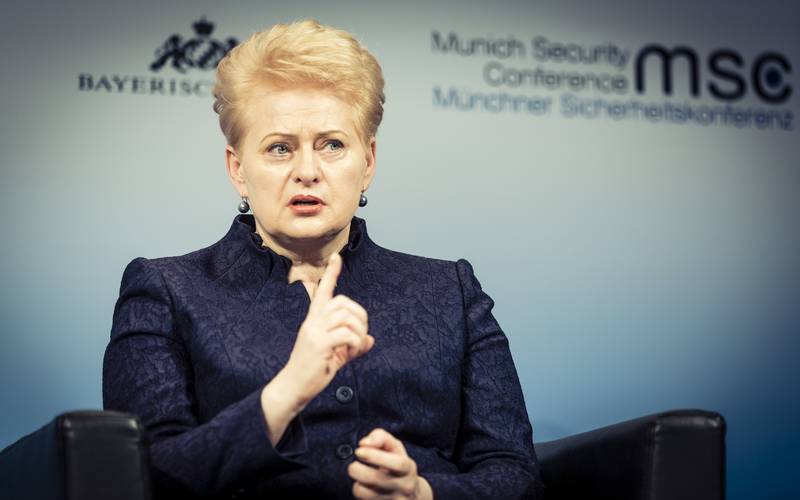 Dalia Grybauskaite | © MSC/Koerner
Dalia Grybauskaite | © MSC/Koerner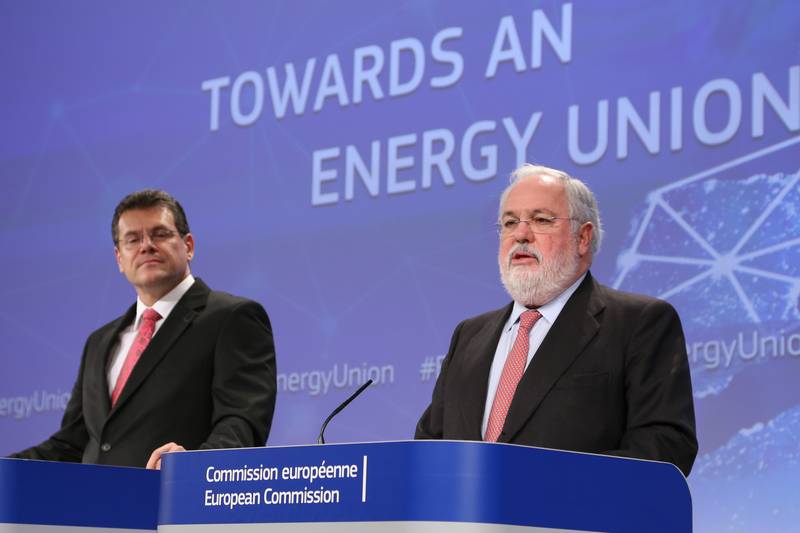 Maros Sefcovic, Miguel Arias Canete | © European Commission
Maros Sefcovic, Miguel Arias Canete | © European Commission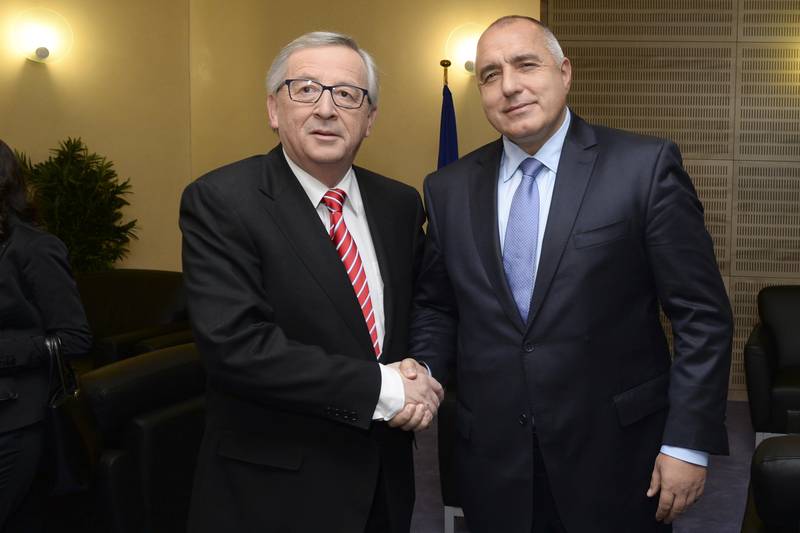 Jean-Claude Juncker, Boyko Borissov | © European Commission
Jean-Claude Juncker, Boyko Borissov | © European Commission